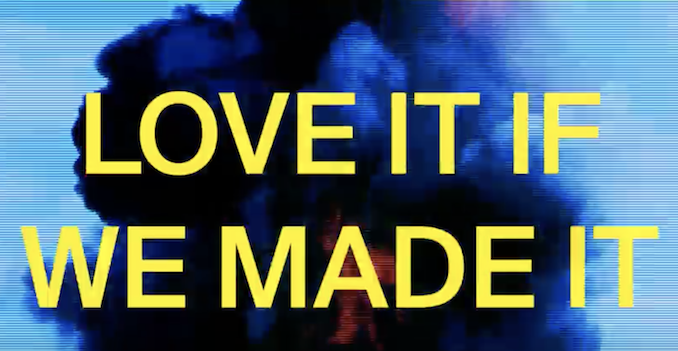
Written by Natalie Gadeikis, Staff Writer

“Powerful songs have always been the engine behind the greatest social movements- It is the marching soundtrack that unites the people and gives them focus and resolve.” – Barrett Martin, Huffington Post
To all of the annoyed parents who have punk sons and daughters that hold the ability to play a composition you see as nothing more than “absurd noise,” look deeper. It is quite possible that they are constructing a roaring anthem for awareness and change on the world’s most controversial social and economical issues. Music is a powerful tool of effective communication, which has the ability to transverse over all boundaries, languages, and countries.
Crafting an appeal to government officials through music is no stranger to the media. Music in politics are commissioned, composed, and performed to meet distinguishable political goals.
In 1983, a punk band, Cross, was a part of the “Stop The City” campaign which foreshadowed anti-globalisation rallies. “Live 8” (A series of benefit concerts) was represented as an example of mass political participation, and was directed at changing the minds and actions of the world’s most powerful politicians. Not only did these musicians and their fans petition world leaders to change their policies on debt relief, but they achieved their aim of doing so.
The Grammy Award-winning rap metal band, Rage Against The Machine, has been active in political protests and activism since they formed in 1991. The band claims to use their music as a way to spread their political ideas.
“I’m interested in spreading those ideas through art, because music has the power to cross borders, to break military sieges, and to establish real dialogue,” said vocalist Zack de la Rocha, in an interview with Tom Morello, co-founder of Rage Against the Machine.
In February 2017, Lady Gaga headlined the Super Bowl singing the patriotic ballad “God Bless America” by Irving Berlin, followed by “This Land Is Your Land,” by Woody Guthrie. Guthrie wrote the song in anger as a response to “God Bless America,” and as a protest against the many inequalities that exist in the United States. The song was revived in the ‘60s, where musicians such as Bob Dylan and The Kingston Trio recorded their own versions, inspired by its political message.
Music journalist, Matty Karas, regarded Bruce Springsteen’s “Born In The USA” as a “perfect distillation of the anger and bitterness seething beneath the surface of a Reagan-era America.” The lyrics within the song illustrate the difficulties and marginalization working class Vietnam veterans had to face after returning to their unwelcoming communities in the United States. The song was used by politicians during rallies, campaign events, and victory speeches, because the lyrics were often overlooked.
Green Day’s signature anthem, “American Idiot” is a explicitly political song of the early 2000s, as well as a voice for the disenfranchised. “I made (“American Idiot”) to give people a reason to think for themselves,” said Billie Joe Armstrong (Rolling Stone, 2007).
Arguably one of the most talked about tracks of last year, “Love It If We Made It,” by The 1975, addresses the social, economic and political controversy that has recently plagued the globe with topics such as the corrupt criminal justice system, toxic self-medication, fear-mongering, the lack of progress on climate change, and the widespread shortcomings of late capitalism. “The thing is right, the obvious thing is it is very sad to see not just young, but young, progressive voices of change being drowned out by regressive ideals. It is sad,” said Matty Healy, at The 1975’s performance at the O2 Arena.
For decades, music has been used as a command for change, and an unstoppable voice for the disenfranchised. Despite the fact that musicians themselves cannot directly change laws or policies on specific issues, they successfully use their platform as a loudspeaker to be heard across countless nations, and to spark each individual who indulges in their music to raise their own voices to change the world. Political music is not a whine, rant, or incomprehensible noise, it is the match that lights the prospering fire.
